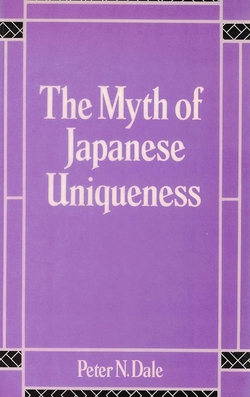 By now, word has got out about the peculiar notion that the Japanese are different from the rest of the world—that their intestines are thirty feet longer than other people's, their brains work differently, and that they can communicate with each other without recourse to words. Stated baldly, these ideas (in Japanese, nihonjinron) appear so outlandish that they could not have much significance. Nonetheless, they are common currency in Japan, even in the most sober-headed and high-level circles, and watered-down versions invariably seep into the discussions of foreigners too.
By now, word has got out about the peculiar notion that the Japanese are different from the rest of the world—that their intestines are thirty feet longer than other people's, their brains work differently, and that they can communicate with each other without recourse to words. Stated baldly, these ideas (in Japanese, nihonjinron) appear so outlandish that they could not have much significance. Nonetheless, they are common currency in Japan, even in the most sober-headed and high-level circles, and watered-down versions invariably seep into the discussions of foreigners too.
Dale exposes two aspects of the nihonjinron fantasy. First, he shows what utter nonsense it is—and not just the long intestines, but also the more plausible aspects. Second, he shows that the claim of Japanese uniqueness is no mere foolish indulgence, but is an integral part of the Japanese self-image that presents an ongoing political challenge to the Japanese body politic. The roots of this concept lie in Japanese fascism, and beyond that in the depths of German nationalism.
Dale has written a wonderful book—witty, elegantly phrased, tough-minded, and highly insightful into Japanese thinking. He is remarkably well read in a variety of subject areas—including literature, psychology, and history—and he draws on these to turn what could be a minor topic into a minor classic.